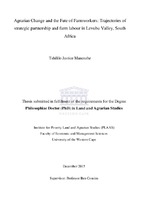Agrarian change and the fate of farmworkers : trajectories of strategic partnership and farm labour in Levubu Valley, South Africa
Abstract
This thesis examines the trajectories of agrarian change on community-owned commercial farms in the Levubu Valley in the northern part of Limpopo Province, South Africa. Levubu
is a locality where fertile land was developed and made highly productive after state-led
dispossession of African communities. White farmers were initially resettled on a state-run
irrigation scheme, but later became independent large-scale commercial farmers linked to
global agro-food markets. The thesis focusses on four Communal Property Associations
(CPAs) that acquired ownership of farms in Levubu. Government’s post-apartheid land
restitution programme required the CPAs to enter into ‘strategic partnership’ agreements with
agribusiness companies. Resettlement of beneficiaries on these farms was ruled out in an
attempt to sustain existing production systems and levels of employment. After these
partnerships collapsed, CPAs have attempted to run the farms themselves, through operating
companies employing professional farm managers. Using key concepts from agrarian
political economy, the thesis seeks to understand the dynamics of production and social
reproduction on the farms and the political tensions that have arisen since restitution
occurred. It also explores how this form of land restitution has impacted on the livelihoods of
farmworkers. The study combines intensive (or qualitative) research methods, involving indepth
interviews, focus groups and direct observations, and extensive (or quantitative)
approaches, mainly in the form of a farmworker household survey undertaken in two
communities. This research design has allowed for ‘retrospective’ analysis of changes over
time to be complemented by ‘circumspective’ analysis of the relations and dynamics of
property, production and power on community-owned farms in Levubu. The main findings of
the study are that neither joint venture companies nor community-owned farming enterprises
have been able to distribute dividend payments to claimant community members as yet.
Rather, when profits have been realised they have largely been invested back into productive
enterprises. Few other benefits have been received either, other than the preferential
employment of some claimant farmworkers on the farms, a small number as managers or
supervisors. Although additional jobs were created in the initial stages of restitution, these
enterprises have struggled to maintain employment levels. Poor management decisions have
meant that increased labour costs have not been accompanied by increases in productivity
and output. Severe tensions and conflicts have arisen within CPAs, manifested in different
forms of identity politics and competing ‘modes of belonging’. Tensions in communityowned
large-scale farming enterprises are explained by the contradictory unity of capital and labour within community-owned enterprises, with difficult choices to be made between
enhancing social reproduction or ensuring accumulation and profitability. These combine
with complex processes of identification in socio-political struggles around access to and
control of key resources. These findings suggest that policy makers should re-examine
assumptions in relation to community-owned farming enterprises and explore mechanisms
through which individual beneficiary households can realise more significant benefits. One
policy option might be to seek the complementarity of large-scale commercial farming and
smallholder farming systems, both on land restored to CPAs through restitution and in
communal areas.

